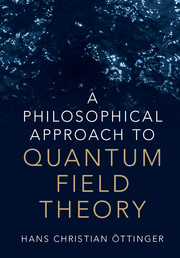Book contents
Preface
Published online by Cambridge University Press: 21 December 2017
Summary
“ALL men by nature desire to know,” states Aristotle in the famous first sentence of his Metaphysics. Knowledge about fundamental particles and interactions, that is, knowledge about the deepest aspects of matter, is certainly high if not top on the priority list, not only for physicists and philosophers. The goal of this book is to contribute to this knowledge by going beyond the usual presentations of quantum field theory in physics textbooks, both in mathematical approach and by critical reflections inspired by epistemology, that is, by the branch of philosophy also referred to as the theory of knowledge.
This book is particularly influenced by the epistemological ideas of Ludwig Boltzmann: ”… it cannot be our task to find an absolutely correct theory but rather a picture that is as simple as possible and that represents phenomena as accurately as possible” (see p. 91 of [1]). This book is an attempt to construct an intuitive and elegant image of the real world of fundamental particles and their interactions. To clarify the word picture or image, the goal could be rephrased as the construction of a genuine mathematical representation of the real world.
Consciously or unconsciously, the construction of any image of the real world relies on personal beliefs. I hence try to identify and justify my own personal beliefs thoroughly and in various ways. Sometimes I rely on philosophical ideas, for example, about space, time, infinity, or irreversibility; as a theoretical physicist, I have a limited understanding of philosophy, but that should not keep me from trying my best to benefit from philosophical ideas. Often I rely on successful physical theories, principles or methods, such as special relativity, quantum theory, gauge invariance, or renormalization. Typically I need to do some heuristic mathematical steps to consolidate the various inputs adopted as my personal beliefs. All these efforts ultimately lead to an image of nature, in the sense of a mathematical representation, but they are not part of this image. The final mathematical representation should convince by its intrinsic logical clarity, mathematical rigor, and natural beauty.
Emphasis on the importance of beliefs, even if they are justified by a variety of philosophical and physical ideas, may irritate the physicist. The philosopher, on the other hand, is used to the definition of knowledge as true justified belief. But how can one claim truth for one's justified beliefs?
- Type
- Chapter
- Information
- A Philosophical Approach to Quantum Field Theory , pp. xi - xiiPublisher: Cambridge University PressPrint publication year: 2018



